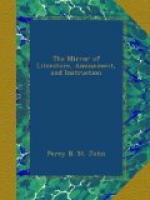“On
the Gwentian shore
The regal banner streams no more.
Nettles and vilest weeds that grow,
To mock poor grandeur’s head laid
low,
Creep round the turret’s valour
rais’d,
And flaunt where youth and beauty gazed.”
W.
* * * * *
THE SELECTOR; AND LITERARY NOTICES OF NEW WORKS.
* * * * *
THE SUNDAY LIBRARY.
This work is intended to consist of “Manuals of Religious Edification, more especially adapted for the LORD’S DAY; as containing the sentiments of many of the more eminent Divines of the Church of England in the Discourses delivered from their pulpits:” or, in plain terms, it is to comprise a Selection of Sermons from the most eminent Divines of the Church of England, chiefly within the last half century. Its editorship is entrusted to the learned and accomplished Dr. Dibdin, who enforces the publication of a religious Library, in these energetic words:—“Let it be specially impressed upon the minds of Christians of EVERY persuasion, that at NO moment can a work, similar to the present, have stronger claims upon their attention and support, than at this precise period, when the elements of civil society seem to be agitated in a variety of directions, and when a sound and sober exposition of Scriptural Truths may essentially contribute to the support of the best interests of the COUNTRY.”
The two volumes before us contain the incomparable Mount Sermon by Bishop Porteus; Bishop Bloomfield on the Choice of a Religion; two Sermons by Paley; prefixed to the latter is a Memoir, concluding with these excellent observations by the Editor:—
“The Sermons of Paley were chiefly a posthumous publication. They were preached to, as they were written for, a country congregation; they are therefore divested of studied ornament of style, and elaboration of argument. But they bear the peculiar impress of the author’s own powerful and unsophisticated mind; and for strength of conception, and clearness and sometimes vigour of expression, it may be questioned whether many in them have been ever surpassed. They are not, strictly speaking, eloquent; but there is a force, as well us a novelty of treatment, in many of them, that put them above all comparison. They are familiar without coarseness, and terse without obscurity. Their main charm may be said to consist in the simplicity and strength with which religious and moral truths are handled; the uncompromising and straightforward manner in which human frailties and sins are exposed; the kindliness of exhortation to repentance and godliness of living; the power, purity, and comfort of the Gospel-dispensation; and, above all, the perfect absence of fanaticism, of an overheated fancy, and of a persecuting spirit. But these




